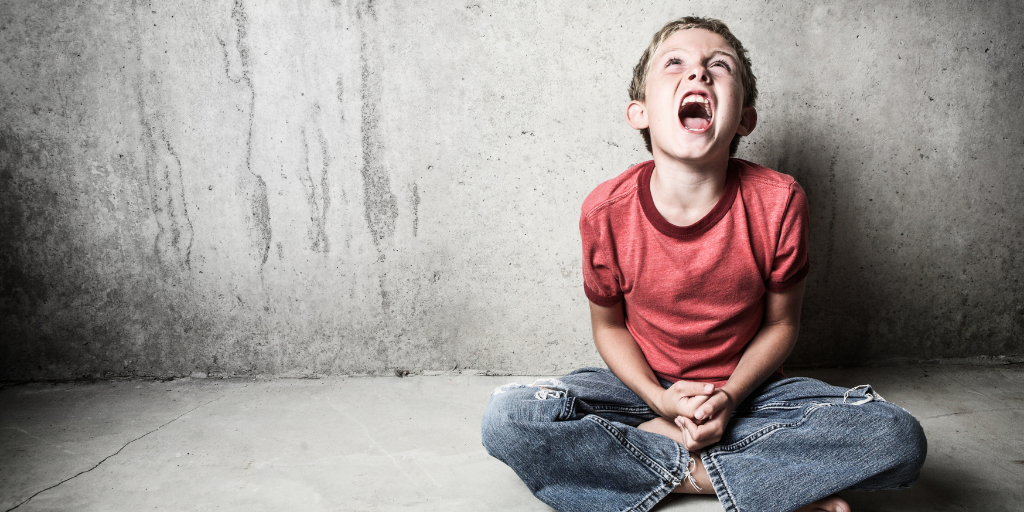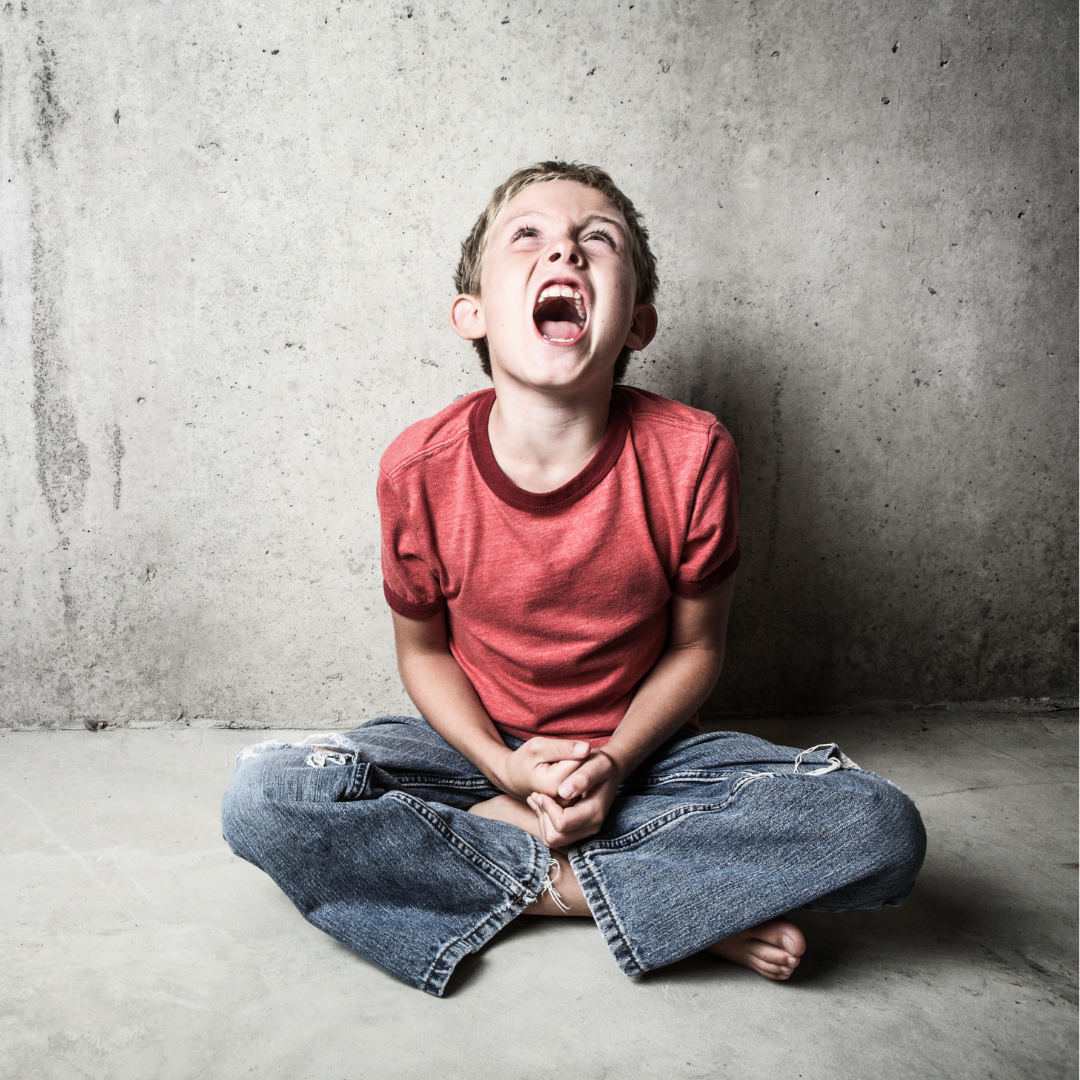
Kathryn Pasker Ineck explores whether expressing anger might actually be a signal that something deeper is going on.
I puttered around, tidying around the sullen child seated at the table. Tidying the remains of the school day was a good distraction: a bottle of glue and a pair of scissors, colored pencils, a protractor, a couple of erasers. I collected the torn, crumpled paper and smoothed out the pieces, carefully taping the math problems back together, then photocopying them so a new worksheet could be managed.
My son blew out an explosive breath.
“You’re not actually angry,” I said conversationally as I wiped the whiteboard clean, even though my nerves were strung tight and I was at a loss of how to manage such big emotions erupting from a such young person.
He picked his head up off his folded arms with an irritated expression on his hot red face, his tear tracks still visible, and his reckless words still ringing in both of our ears. “Yes. I. Am.” he said purposefully and forcefully.
“Maybe you are,” I conceded, “but I don’t think so.” I stopped bustling and sat on a chair next to him. “Do you think that maybe, instead of angry, you are something else? You have a lot of giant feelings that don’t feel good. When that happens to me, I usually think I am mad, but usually I am scared, or frustrated, or worried … or even hungry.” I nudged him playfully with my elbow. He shrugged. “I think that you could use a snack and that the math was really hard today. You need some Brain Food. And you need to remember that you aren’t supposed to already know how to do new things. School is for learning and sometimes that’s hard.”
“I am really, really, REALLY mad,” he said through clenched teeth. He paused. “Actually, I think maybe I do want a snack. And I think maybe I’m afraid that I won’t get my screen time later if my work isn’t done yet.”
I’d like to say that there were no more disagreements that day, or on other days with the same feelings and frustrations repeated with each of my kids, but feelings are hard to process, especially when my own feelings about their feelings are thrown in the mix. This isn’t the kind of righteous anger that Jesus felt at the temple when He overthrew the money changers’ tables: that kind of anger is positive because it is our reaction to an injustice that propels us to make a difference. The big issue here is that when people experience strong, negative emotion, they read it as anger, whether it’s their own strong emotion or someone else’s. Author Jeannie Ewing writes,
Anger is often what is considered a ‘blanket emotion.’ This means that we tend to express anger as a coverup for other, more painful feelings, such as fear or grief. Anger is really a tool. In positive situations, it functions as a barometer to invite us to deeper self-awareness that leads to self-knowledge. (Catholic Digest)

I see a lot of anger these days—in conversation, on social media, and on the news. Even our parishes are not immune: my husband and I occasionally pick up a friend’s son from his Catholic school and are staggered by the honking, glaring, and yelling in the school parking lot that we have been the brunt of and witnesses to. One of my dear friends showed me the ropes in that parking lot one afternoon and said, “Oh, yeah, picking the kids up from school is a definite occasion for sin here.” A recent Gallup poll states that this isn’t just my imagination: more people report feeling angry than ever before in the past. The big question is: what does anger do for us? We wouldn’t react in anger if it didn’t somehow feel as though it was accomplishing something.
Anger allows us to feel as though we are in control. So much happens that is out of our hands: politics, other people’s behavior, global unrest, coronavirus. We no longer feel like we are in control. Of anything. So we flash hot and lash out in anger. We feel strong. Vindicated. In control. Profanity is now widely used without scrutiny.
Sometimes the anger works for us: if we react in anger, our loved ones or coworkers will see that something is genuinely bothering us, and that can be a catalyst for change. Most of the time, though? The anger festers and turns inward. Unless. What if we weren’t actually angry?

Accepting anger at face value means that we don’t have to do the hard work to be vulnerable. We can feel numb to the reality of what is truly bothering us. When we recognize that we feel a strong negative reaction to a situation and stop to really look at it, we are able to name the underlying emotion: fear. grief. pain. loneliness. frustration. hunger. exhaustion.
The problem with this is that naming the emotion can sometimes feel like we are more out of control than just being angry. Claiming grief feels vulnerable, while claiming anger feels powerful. (A note here: when someone has lost a loved one, it is very normal and even helpful to feel angry at God. Why is it helpful? Because He can handle our anger, He understands our anger, and He knows that the numbing effects of anger can help us weather the shock of death in order to deal with our grief after we have been able to process the experience. If you have friends in this situation, remember to accept all of their feelings as they come to terms with their loss.)
Understanding what is underlying our anger, though, ultimately brings peace because it resolves the emotional unrest and it restores us to true joy. We are unburdened from carrying the weight of “anger” and have more room in our hearts and minds to truly enter into community with one another.
Copyright 2022 Kathryn Pasker Ineck
Images: Canva Pro
About the Author

Kathryn Pasker Ineck
Married for more than two decades to her best friend, and mom of four teens, Kathryn finds that life is never boring. She pursues the heart of God--led by His gentle Mother--and relies on the Divine Mercy Chaplet, a desire for chocolate, and an insatiable thirst for reading into the wee hours of the morning. She writes to maintain her sanity at Kathryn Pasker Ineck.


.png?width=1806&height=731&name=CatholicMom_hcfm_logo1_pos_871c_2728c%20(002).png)
Comments